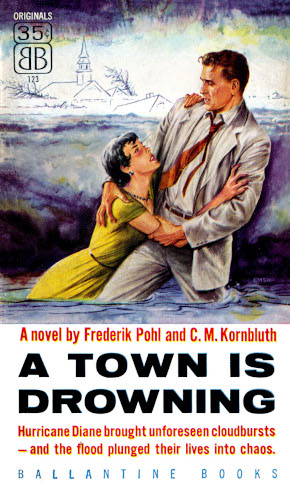
A TOWN IS DROWNING
by
FREDERIK POHL
and
C. M. KORNBLUTH
BALLANTINE BOOKS
NEW YORK
This is an original novel—not a reprint—
published by Ballantine Books, Inc.
© 1955 by Frederik Pohl and C. M. Kornbluth
Library of Congress Catalog Card No. 55-12407
PRINTED IN U.S.A.
BALLANTINE BOOKS, INC.
404 Fifth Avenue, New York 18, N. Y.
[Transcriber's Note: Extensive research did not uncover any
evidence that the U.S. copyright on this publication was renewed.]
By Frederik Pohl and C. M. Kornbluth
Contemporary Novel
A TOWN IS DROWNING
Science Fiction
THE SPACE MERCHANTS
SEARCH THE SKY
GLADIATOR-AT-LAW
TORN FROM TODAY'S HEADLINES
This novel takes you right into the heart of the new flood country,the Northeast United States which had generally been free of hurricanesand attendant floods. Now disaster has struck, more than once—terribleand grim.
Although this novel will give you an accurate and brilliantlyvivid picture of what it's like to live through a flood, even moreimportantly it will show you what the people are like who fought thecatastrophe and how those who survived are still fighting. In thepersons of Starkman the burgess, Groff the dynamic young executive,Sharon the shrewd opportunist, Mrs. Goudeket, the resort owner, andothers, you will meet and understand the varying human elements thatthe flood unleashed and intensified. Through it all you will sense agrowing feeling of pride—that despite the selfishness of some, thepeople of the town met the terrible onslaught with courage and a senseof mutual help.
Already well known for their superb science fiction, Frederik Pohl andC. M. Kornbluth demonstrate here their equal power in the realisticcontemporary novel.
CHAPTER ONE
The man in the filling station was clearly of two minds about it, butfinally he buttoned up his raincoat and pulled on his hat and came outto Mickey Groff's car. "Sorry to make you come out in the rain likethis," Groff said. "Fill it up, will you?"
He rolled up the window and picked out the least soaked wad of Kleenexto wipe the mist off the inside of the windshield. The car radiostopped playing show tunes and began to talk about freezer food plans.Groff snapped it off and leaned back to watch the turning dials on thegas pump. By the time the man had put back the cap and sloshed aroundto the window Groff had the exact change ready in his hand. "How far isit to Hebertown?"
"Five miles," the attendant said, and went inside without counting themoney. As Groff pulled out he saw the lights go out on the pumps andthe big sign overhead.
You couldn't blame him, he thought; there weren't enough cars out inthis rain to make it worth while. He had been lucky to find even onestation open.
It was nearly impossible to see the road, no matter how hard thewindshield wipers worked. Rain was spraying in somehow; all the windowswere closed tight, but Groff could feel the thin mist on his face. Herolled around a long, downgrade curve, and when he touched the brakefor a moment there was a queasy slipping sensation; the rain was comingdown faster than it could flow off the highway.
Foolish to drive all the way to Hebertown, Groff reflected; but theonly alternative, actually, was to take a bus. The railroads didn'tbother much with this little out-of-the-way corner of the state. And